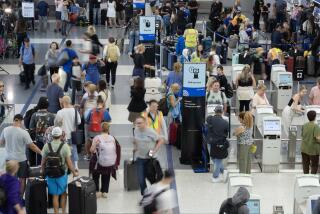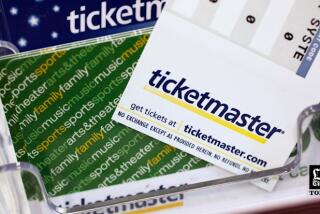Stolen or Lost Air Tickets? It’s the Passenger Who Pays
Here’s a waking nightmare for you: It was April 5, and Stan Hirsch, assistant principal of La Reina High School in Thousand Oaks, was accompanying a student group on a tour of England and Ireland. The group was checking into its Dublin hotel, and Hirsch was handing out room keys when suddenly he realized that something was missing. His carry-on bag. With 27 sets of Dublin-London-Los Angeles airline tickets in it. Stolen from the lobby while he stood a few feet away.
Hirsch had taken at least half a dozen previous groups to Europe. But over the next 24 hours, Hirsch got a jarring lesson in how demanding airlines can be when travelers’ tickets are lost or stolen.
Typically, these episodes begin with a traveler who has misplaced a ticket, or had it stolen, and assumes that it can be replaced quickly at minimum cost with a few keystrokes by a reservations agent. It may, indeed, sound easy, but to get those keys stroked, most out-of-luck passengers have to buy a new ticket, make a refund request, pay an administrative fee, then wait as long as six months for a refund of the first ticket’s cost.
“I get probably one lost ticket a year,” says Susan Dushane, an agent with Travel by Greta in Northridge. “But very often, people will call hysterically, saying, ‘I’ve lost my ticket!’ When you tell them there’s a penalty, it’s amazing how diligent they become. They tear apart their homes, and they find them.”
Dushane acknowledges that many travelers find the airline penalties unfair, but she offers this comparison: “If you go to Bullock’s and buy a dress, and then you go back to Bullock’s and say, ‘Guess what? I lost the dress,’ Well, Bullock’s is not going to give you your money back.”
It is true that Southwest, United and other airlines are offering more and more “ticketless” travel, in which travelers on domestic flights need only recite a confirmation number and show photo ID at the airline counter to get their boarding passes. But once they have issued tickets, most airlines think of them essentially as cash. Critics may argue that tickets and cash are not one and the same, especially since terrorism-wary U.S. airports have started requiring travelers to show photo I.D. to get their seat assignments, thereby giving airlines a chance to match the traveler’s name with the ticket-purchaser’s name. But airline policies remain unchanged.
In fact, if you buy a ticket at an advance-purchase discount rate, lose it, and need to buy a replacement at the last minute, an airline can charge you a higher fare for the replacement. If you go through the refund-request procedure, you’ll probably get the cost of the replacement ticket eventually refunded, but that may not comfort you much in the midst of the crisis.
Back in Dublin, none of this was good news for the La Reina High School travelers. Hirsch recalls a “rather hairy afternoon” of fruitless searching and another day of entreaties to and negotiations with American and Aer Lingus airlines.
Aer Lingus, the Ireland-based carrier handling the group’s travel between Dublin and London, charged only a single $50 administrative fee for the group. American Airlines didn’t demand that the group buy replacement tickets and then make refund requests, but it did require administrative fees of $60 per missing ticket--$1,620, in all. The travelers found the money and continued on their way.
Upon return, the coach of the school’s mock trial team, Westlake Village attorney Donald C. Glynn, fired off a complaint letter to American Airlines executives, calling it “outrageous” that the carrier would demand so much money for the simple reissue of tickets to a troubled school group, and noting that the travelers were treated better by a foreign carrier than they were by a U.S. airline.
By the time I reached Stan Hirsch, American Airlines had come up with a goodwill gesture--$1,620 in credit toward future flights. The U.S. Transportation Department urges travelers to write down their ticket numbers on a sheet of paper and keep it separate from their tickets. That way, if the ticket is lost, the airline can process a refund application quicker. But in general, officials warn that travelers may have to pay a handling fee (typically about $60) and wait two to six months for a refund.
If you lose a ticket, report it to your travel agent or the airline immediately. Beg for mercy when it comes to paying the cost of reissuing the ticket. If the first airline representative is unsympathetic, ask for a supervisor.
Results depend on a list of variables, says Delta Airlines spokesman Clay McConnell; he adds that re-ticketing “is generally easier if you’ve already commenced travel.”
Also keep in mind that “non-U.S. carriers tend to not to be as rigid in their rules,” Dushane says. “They evaluate each situation. When you deal with a U.S. carrier, unless you get to the right person immediately, people will adhere to the rules.
Reynolds travels anonymously at the newspaper’s expense, accepting no special discounts or subsidized trips. To reach him, write Travel Insider, Los Angeles Times, Times Mirror Square, Los Angeles 90053; telephone (213) 237-7845.
More to Read
Sign up for The Wild
We’ll help you find the best places to hike, bike and run, as well as the perfect silent spots for meditation and yoga.
You may occasionally receive promotional content from the Los Angeles Times.







